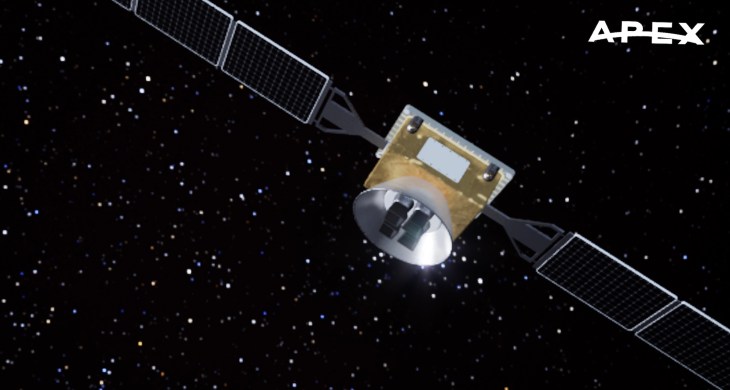Apex Space, a startup that aims to transform satellite bus manufacturing, emerged from stealth Monday with a $7.5 million seed round led by Andreessen Horowitz.
The Los Angeles-based company has set its sights on the satellite bus — the part of the spacecraft that hosts the payload — which it says is the “new bottleneck” hitting the space industry. Apex’s two co-founders, Ian Cinnamon and Maximilian Benassi, said in a blog post that they independently observed core changes to the industry that convinced them that a new satellite bus manufacturing solution was needed.
Cinnamon, a technology startup founder whose company, Synapse Technology, was acquired by Palantir in 2020, said he saw payload customers being “held back” by the long and costly process associated with building custom satellite buses. Benassi, an engineer whose career includes a six-year tenure at SpaceX and nearly a year-and-a-half at Astra, observed changes to launch economics that make mass manufacturing — rather than the bespoke engineering process that’s characterized satellite buses thus far — more sensible.
“Given this transformative change, we must begin to think about spacecraft differently and adapt to the new market conditions,” the pair said. “We cannot just build spacecraft. We must manufacture them at scale.”
This approach, which Cinnamon described in an interview with TechCrunch as scalable and product-led, is a major departure from traditional satellite bus manufacturing. Apex aims to deliver satellite busses to customers in a matter of months, rather than the status quo timescale of a few years.
Apex will come to the market with a small satellite bus called Aries, which will be capable of carrying payloads up to 94 kilograms. That platform will be suitable for missions to low Earth orbit; the startup says on its website that future products will be compatible with other missions, such as those to geosynchronous orbit. Apex also offers add-ons like insurance and flight booking. Cinnamon said the company plans on delivering the first Aries platform in 2023, followed by 5 in 2024, and continue to scale from there.
While the two co-founders praised the likes of Astra and Rocket Lab for transforming the launch sector, these companies are also competitors, each designing satellite buses as part of a full-stop-shop solution for customers. Other major players in the satellite bus manufacturing space are Terran Orbital, which announced plans last year to build a 660,000-square-foot satellite manufacturing facility in Florida, and York Space Systems, which landed a $1.12 billion valuation after selling a majority stake to Firefly Aerospace’s owner AE Industrial Partners. But Cinnamon said Apex is differentiating itself from these players in a few different ways: the first is that the startup’s “bread and butter” will be commercial customers, rather than government customers. He added that the company is aiming to manufacture on a scale of a matter of months to keep up with demand from the commercial sector.
The call for large-scale manufacturing clearly found resonance at Andreessen Horowitz, which launched a new fund at the beginning of this year called “American Dynamism,” led by general partner Katherine Boyle. The fund aims to invest in companies that bolster the nation’s interest and solve problems in industries like supply chain, aerospace and manufacturing (amongst others). As Boyle argued in her sweeping investment thesis, “the only immediate way to kickstart American renewal is through startups building for critical problems.” To the Apex co-founders, solving the satellite bus manufacturing problem isn’t just critical to the space industry today. It’s also key to making humans a multiplanetary species in the future.
“If we really think about that future, do we think that all of the other spacecraft that are out there, that are moving around goods and services, that are doing imaging of Mars and the Moon, that are providing communication services, etcetera, are all of those spacecraft truly going to be built by hand as custom one-offs like they are today? Or are they actually going to be manufactured at scale? And I believe that in order to enable that future, they have to be manufactured at scale, and we want to be the first company out there to truly scale up manufacturing of these vehicles.”
In addition to a16z, the round also saw participation from XYZ Venture Capital, J2 Ventures, Lux Capital and Village Global. The number one priority for the new funding is hiring, Cinnamon said, and the company is looking for people from new space, traditional aerospace, and outside the space sector entirely. The company will also use the raise to continue developing the Aries platform, including ordering components and beginning to assemble the manufacturing line.
